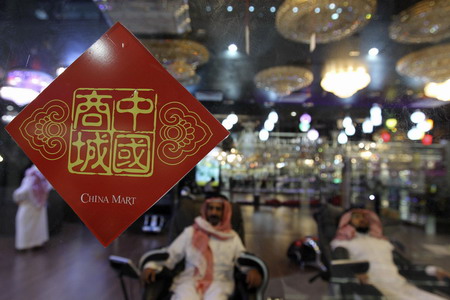Business
Chinese investments aid international trade
By Ding Qingfen (China Daily)
Updated: 2010-11-11 08:04
 |
Large Medium Small |
|
|
BEIJING - While the global economic recovery is still underway, the world is enthusiastically welcoming Chinese investment, betting that the nation's know-how and funds will help create more jobs and help rescue ailing economies.
"Although few Chinese enterprises have a presence in Bahrain, we believe the prospects are promising, as we plan to launch more preferential policies to attract them, the infrastructure will be maturing, and the local economy is growing at a fast speed," said Esam Abdulla Fakhro, chairman of the Bahrain Chamber of Commerce and Industry.
"We expect Chinese enterprises will use Bahrain as a center for the Gulf region," he said.
In early November, the chairman led a delegation to Beijing to promote Bahrain as a competitive foreign investment destination. The delegation also attended the Second China Overseas Investment Fair.
In Africa, two Zambia-China economic and trade cooperation zones have come into operation, with one located in Lusaka. The zones aim to encourage Chinese companies to establish a presence.
"China is the largest investor in Zambia. Chinese investments are very important for our economy, making a contribution to our development and economic growth," said Joyce M. C. Musenge, the Zambian ambassador to China.
Currently, China's investment is mainly in the mining and infrastructure sectors, but "we want to encourage more in other sectors, including agriculture", she added.
As the process of globalization accelerates and demand for overseas expansion grows, China's outbound direct investment (ODI) has been on an upward trend in the past few years, and the global financial crisis has helped to confirm the country's position as a powerful investing nation.
In 2009 alone, China's ODI increased 14.2 percent year-on-year to $47.8 billion. That was against the backdrop of a 40 percent decline in global foreign direct investment volume. The same year saw China rise in the lists to become the fifth-largest investing nation worldwide, moving from 12th in 2008.
By the end of 2009, China's 12,000 companies had established 13,000 operations overseas in more than 170 countries and regions.
"China is one of the most significant global investors. Traditionally, China focuses on labor-intensive sectors when going overseas, but nowadays more and more investment targets high-end industries," said Mario Amano, deputy secretary-general of the Organization for Economic Cooperation and Development.
For many emerging markets, Chinese investment helps domestic industries sharpen their competitive edges through increased expertise, and creates more jobs.
The reason why Bahrain makes a strong effort to attract investment lies in the "technical knowledge and potential for growth that China has", said Fakhro.
Switzerland, where only 50 Chinese companies have operations, is encouraging a greater investment flow, said Claudio Mazzucchelli, counselor and head of the Swiss Business Hub in China.
"We are aiming at Chinese companies in all sectors, such as finance, manufacturing, logistics, information technology, solar energy, packaging and so on ... more Chinese investments will hire more people, create jobs, and pay taxes in Switzerland," he said.
Official negotiations on a Free Trade Agreement (FTA) between China and Switzerland will soon be launched. The agreement, once established, "will make Switzerland the first European country to set up an FTA with China, and provide a boost to bilateral trade and investment", he added.
For Zsolt Becsey, Hungarian economics ministry state secretary, investment from Huawei Technologies Co - China's largest networking and telecommunications equipment supplier, and also one of the largest Chinese investors in Hungary - is a blessing to the local economy.
Huawei has increased its staff numbers in Hungary to 500, and will hire another 500 by the end of this year.
Zhou Siyu contributed to this story.
China Daily
